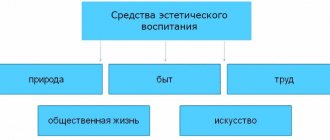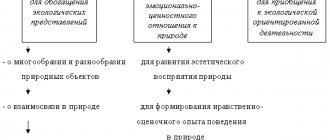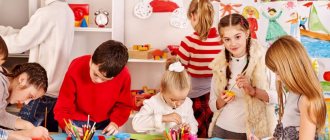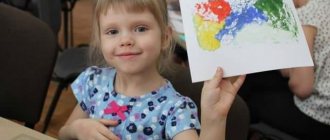Functional role of the preschool teacher
The professional activity of a preschool teacher comes down to his performance of the following functions in the implementation of the educational process of a preschool educational institution:
- Communicative interaction with students. This requires skills in constructive communication and interaction with children of different age groups. The development of communication skills of preschool children and their comfort in the educational space of a preschool educational institution depend on the teacher’s ability to find an approach to each student and build a system of interaction with him.
- Design of the educational process of preschool educational institutions. The teacher plans the implementation of educational and training work with preschoolers, is involved in its implementation and analyzes the success of achieving educational goals and objectives.
- Respect for the rights and freedoms of students. The teacher must protect the rights and freedoms of each child and ensure the safety of his health.
- Cultural development of the younger generation. The teacher instills in children the cultural foundations of life, develops skills of cultural behavior in different spheres of public life and different situations.
- Coordination of the work of the assistant teacher in the implementation of the unified educational process of the preschool educational institution.
Are you an expert in this subject area? We invite you to become the author of the Directory Working Conditions
In the course of performing his professional functions, the teacher unwittingly puts the imprint of his personality, his development, skills, and experience into the development of each student. He acts as a connection between children and the world of adults. If previously this connection was carried out only through parents, then at the stage of preschool education it is also formed by the teacher, who shows children an example of his social development and interaction.
Profession of a teacher in a children's educational institution
A teacher is a specialist in the education and training of preschool children. In fact, this period covers from six months to 6 years, that is, the most important years in a child’s life. At this time, he is formed as a person, his character is sculpted and strengthened, and opportunities are revealed. In addition, during this period, basic knowledge is laid down, which will then be used by a person throughout his life.
This means that the work of a teacher with children of this age is extremely important and responsible. The future of each of his pupils depends on how successful the teacher will be as a professional, on the level and quality of the pedagogical experience of the preschool teacher.
Teachers work in different types of preschool institutions: kindergartens, orphanages, boarding schools, specialized children's educational institutions. In fact, they replace parents for pupils, taking care of their upbringing, training, daily care, health care and instilling correct habits and behavior.
Responsibilities of a teacher in the workplace:
- Care and supervision of children of the group entrusted to him.
- Training in self-service skills, hygiene, table manners, household activities, personal safety, and so on.
- Training in various activities and operations including artistic elements, dance, music, sports and so on.
- Maintaining a daily routine.
- Interaction with parents of students, teaching staff and management of preschool educational institutions.
- Compliance with your job responsibilities.
- Constant self-improvement and self-development.
- Maintaining numerous documentation.
Pedagogical methods occupy a special place in the work of a teacher. He doesn't just act like a "substitute mom and dad" while they're at work. A preschool teacher has a much broader and more responsible role. He is busy raising a child as an individual, which means that he needs extensive knowledge in many different disciplines - in the psychology of preschool age, teaching methods, the ability to attract and retain attention, as well as a huge number of other skills. In particular, he should have the ability to draw, sculpt, make crafts from various materials, dance, sing, recite poetry, design and organize holidays, matinees and special events, work with parents and much more. All this suggests that the teacher himself must not only love children with all his heart, but also be a comprehensively developed, harmonious person.
Variability of teacher roles in preschool education
At the stage of preschool education, the teacher performs the following roles:
- Educator-advisor. The teacher helps children understand various aspects of life, work operations, communicative interaction, the learning process, self-care, etc. In this case, the teacher plays the role of a mentor who shapes the direction of the child’s development and helps him navigate different circumstances of life and activity.
- Educator-teacher. It implements the education of preschool children. His responsibilities include motivation to understand different aspects of the surrounding reality, the formation of skills in various types of activities. A preschool teacher lays the foundation for the cognitive development of the younger generation.
- Teacher-friend. In the educational process of a preschool educational institution, a child needs a friendly shoulder. This is especially true in the initial stages of preschool education. He needs to structure his communication with the child in such a way as to make him an equal partner, raising him to his level. At the same time, your position as a mentor should not be cast aside. A child must respect, trust and rely on an older friend.
- Assistant teacher. The teacher provides children with a variety of assistance, helps them solve problems that arise during their stay in the preschool educational institution. At the same time, the teacher needs to remain calm and adequately respond to the problems of the students. This will give them self-confidence and ensure that children have a positive emotional perception of their stay in a preschool educational institution.
- The teacher is the mother. The teacher needs to show love and sympathy to children, affection at the right moments and severity when necessary. Harmonious use of these skills ensures the child’s comfortable development within the preschool educational institution and eliminates the feeling of alienation when entering a new environment, different from home.
Finished works on a similar topic
Course work The role of the teacher in preschool education 420 ₽ Abstract The role of the teacher in preschool education 270 ₽ Test work The role of the teacher in preschool education 190 ₽
Receive completed work or specialist advice on your educational project Find out the cost
The many roles of the teacher determine his importance in the educational process of the preschool educational institution.
The role of the teacher in the upbringing of preschool children.
There are many professions on Earth, among them one of the important ones is the profession of a teacher. Teachers educate those who will tomorrow replace the current generation, work, so to speak, with “living material”, in a word, the work of a teacher is done without rehearsals, without drafts, straight away. Pupils are unique individuals who live not in the future, but now, today. In addition, it is impossible to look through and not notice a child’s inclination towards something. A teacher’s mistake in working with children can affect an adult in the future.
Pedagogical skill largely depends on the personal qualities of the teacher, on his skills and knowledge. The personality of the teacher, its influence on the student is enormous; it will never be replaced by pedagogical technology.
All modern researchers note that love for children should be considered the most important personal and professional trait of a teacher, without which effective teaching activities are not possible. You should work with children only by calling, only if children are part of your life. L.N. Tolstoy also wrote: “If a teacher has only love for his work, he will be a good teacher. If a teacher has only love for the student, like a father and mother, he will be better than the teacher who has read all the books, but has no love for either the work or the students. If a teacher combines love for his work and his students, he is a perfect teacher.”
In addition, the profession of a teacher requires comprehensive knowledge, boundless spiritual generosity, and wise love for children. Taking into account the increased level of knowledge of modern children, their diverse interests, the teacher himself must develop comprehensively: not only in the field of his specialty, but also in the field of politics, art, culture, he must be an example of morality, a bearer of human virtues and values.
Education is considered by pedagogy as a leading factor, since it is a specially organized system of influencing a growing person to transfer accumulated social experience. The role of the teacher, and especially his skill and skill, is very important here. The social environment is of primary importance in the development of the individual: the level of development of production and the nature of social relations determine the nature of the activities and worldview of people.
Genetics - believes that people have hundreds of different inclinations - from absolute pitch, exceptional visual memory, lightning-fast reactions to rare mathematical and artistic talent. But the inclinations themselves do not yet ensure abilities and high performance results. Only in the process of upbringing and training, social life and activity, and the acquisition of knowledge and skills are abilities formed in a person based on inclinations. The inclinations can be realized only through the interaction of the organism with the surrounding social and natural environment.
Creativity presupposes that an individual has abilities, motives, knowledge and skills, thanks to which a product is created that is distinguished by novelty, originality, and uniqueness. The study of these personality traits has revealed the important role of imagination, intuition, unconscious components of mental activity, as well as the individual’s need to discover and expand their creative capabilities. Creativity as a process was initially considered based on the self-reports of artists and scientists, where a special role was given to “illumination,” inspiration and similar states that replace the preliminary work of thought. In order for a child to reveal his creative potential, it is important that the teacher correctly reveals and directs his abilities in the right direction.
“An educator who is on par with the modern course of education feels himself. a mediator between everything that was noble and lofty in the past history of people, and the new generation, the keeper of the holy covenants of people who fought for the truth and for good. He feels like a living link between the past and the future, a mighty warrior of truth and goodness, and realizes that his work, modest in appearance, is one of the greatest works of history.”
It is known that personality development is an active self-regulating process, self-movement from lower to higher levels of life, in which external circumstances, training and education act through internal conditions. With age, the role of an individual's own activity in his personal development gradually increases.
Let us remember the words of K.D. Ushinsky: “...Education, as it improves, can far expand the limits of human strength: physical, mental, moral.” The purpose of life and its happiness, the great Russian teacher asserted, consists of ever-expanding, free, progressive activity that meets the needs of the soul. This is an activity with full dedication of strength - physical, intellectual, emotional, moral. In the process of such activity, human development occurs, because the mind, heart, and will actively participate in it.
Unconsciously, the child is drawn to activities that promise him development opportunities. He engages in it with passion and perseverance until he masters it so much that the value of this type of activity is exhausted. A new, more complex type of activity is needed, and adults help children find it.
Increasing complexity, introducing new types of activities, developing demands on the child, expanding the range of his independent actions - all ensure progress in his development. At the same time, it is important to see the germs of something new in the child’s psyche and, taking them into account, make timely adjustments to work with him, and not remain at the level of the previous relationship with him, which has exhausted its possibilities of techniques. If a child standing on the threshold of a new stage in the formation of vital forces is offered the same types of activities, this will stop his development. If, due to some unfavorable circumstances, a child is switched to activities corresponding to a lower level of development than the one he has already achieved, this will lead to degradation, a decline in development, and intellectual and emotional impoverishment of the personality. Educational work can be carried out effectively only if it is structured in such a way that it contributes as much as possible to the development of the individual. Its flourishing is the goal, the result towards which the teacher strives. The focus on maximizing the development of children’s vitality and abilities encourages us to work with them more thoughtfully, constantly introducing new elements into it.
So, the task of the teacher is to take care, when organizing educational activities, not only about the assimilation of subject knowledge, but also about the formation and development of socially oriented motivation, the formation of responsibility for the tasks he performs, the ability to take into account others, think about their interests, develop your creativity and talent.
Play, the most important type of children’s activity, plays a huge role in a child’s cognitive activity. It is an effective means of shaping the personality of a preschooler, his moral and volitional qualities; it is in the game that the need to influence the world is realized. “A game is a huge bright window through which a life-giving stream of ideas and concepts about the world around us flows into the child’s spiritual world. A game is a spark that lights a fire,” said K.D. Ushinsky. And it’s hard to disagree with this.
The educational significance of the game largely depends on the professional skills of the teacher, on his knowledge of the child’s psychology, taking into account his age and individual characteristics, on the correct methodological guidance of children’s relationships, on the precise organization and conduct of all kinds of games.
Children's creativity is manifested in the concept of the game and in the search for means for its implementation. How much creativity is required to decide what journey to take, what ship or plane to build, what equipment to prepare! In the game, children simultaneously act as playwrights, decorators, and actors. However, they play for themselves, expressing their dreams and aspirations, thoughts and feelings that possess them at the moment. Therefore, play is always improvisation, communication with peers. efforts to achieve goals, common interests and experiences.
In play, children's mental activity is always associated with the work of their imagination; you need to find a role for yourself, imagine how the person you want to imitate acts, what he says. Imagination manifests itself and develops in the search for means to accomplish what is planned.
The role of the teacher in shaping the child’s personality is very great. The type of people they will grow up depends on how and what tools the teacher uses to raise children. The main purpose of the teacher is the maximum development of each child, preserving his uniqueness and revealing his potential abilities.
Practical questions
Beginning educators often ask whether working as an educator is included in their teaching experience. It depends on what position the teacher occupies. Teachers and senior teachers can apply for an early teaching pension, since their work is included in their teaching experience. But this provision does not apply to assistant teachers and junior teachers, since, according to the nomenclature, their position does not relate to teaching.
Also, many are interested in working as a teacher without a pedagogical education. At the moment, only a person who has a higher or secondary pedagogical education in the specialty “Education and Pedagogy” can become a teacher, as well as one who has a higher or secondary vocational education and additional education in the field of “Education and Pedagogy”.
Teacher competencies
The goal of a teacher’s pedagogical work is to educate a free, comprehensively developed, mentally and physically healthy, creative personality. After completing his stay in a children's educational institution, a child must be fully prepared to study at school, that is, have the necessary set of knowledge and skills, the ability to communicate freely, the ability to take care of himself at the proper level, good health and a developed, stable psyche. To carry out such responsible work, a kindergarten teacher needs the following competencies:
- Communication skills. The teacher will have to constantly communicate, not only with children, but also with their parents, other adults, colleagues and management.
- Correct oral and written language. Children absorb information like a sponge, which is why it is so important that they hear literate speech, on the basis of which their own speaking and sentence-forming skills will be formed.
- The ability to tell interesting stories and present information in an easy and attractive manner. Children, especially from younger groups, are unable to perceive complex verbal structures and fix attention on one object and moment. The teacher is required to be able to competently and measuredly present information so that it can be fully assimilated without overloading the child.
- Emotional intellect. The teacher will need the ability to generously share his emotions with children.
- Self confidence. Children are clever manipulators. They will not forgive weakness of character; such a person will not have authority in the group.
- Friendliness.
- Positive attitude.
- The ability to empathize, empathy. This is one of the most important human qualities of a teacher.
- Attractive and well-groomed appearance. This requirement applies to both the health and appearance of the teacher, since children copy everything, and aesthetic education also includes appearance.
- Patience. Working with one child is difficult, but working with many different characters is very difficult. It will take a lot of love and incredible patience.
- Resistance to stress. This is a very important quality, since the work of a teacher is full of stress.
- Organization is an important condition for a teacher’s work in a group, when it is necessary to provide training, education and guarantee the health of a dozen or more pupils.
- Ability to motivate. Without this, it will not be possible to engage children in any activities.
- Creativity. Modern requirements force educators to abandon the authoritarian teaching method, paying more and more attention to progressive innovative methods. And they require from the teacher not only extensive knowledge and practical skills, but also the ability to take a creative, inventive approach to their work.
- Curiosity. In the teaching profession, you cannot stop at any one method or technology; you need to constantly learn new things and implement them in your professional activities.
To determine quality and success, as well as identify possible errors and shortcomings, an analysis of the teacher’s pedagogical work is used. Based on its results, one can judge how well the teacher copes with his professional responsibilities. Also, such an analysis serves as the basis for awarding a particular qualification based on the results of certification.
The participation of educators in the work of pedagogical councils is also of great importance. They hold creative reports, exchange of experience, discussion of inspections carried out, and so on. All this has a positive effect on the future activities of the teacher in the preschool educational institution.
Various publications, printed and electronic publications, specialized websites and forums also help to successfully understand the complexities of work, especially for young professionals. Ready-made coursework on the pedagogical activities of a teacher can also be used as supporting material. These are not samples for copying, but a way to systematize and assimilate information important for your own future activities.





